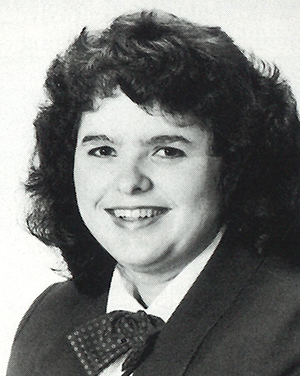Sherry Clark, ’87, went ‘from hell to Harvard’
 Sherry Clark, ’87, beat the odds in a big way. A welfare mother until a few years ago, Clark now practices law with a degree from the Harvard Law School. On her way to Harvard, she earned a degree in society and justice from the UW—taking four years’ worth of credits in three and one-half years—while working part-time and caring for her two daughters.
Sherry Clark, ’87, beat the odds in a big way. A welfare mother until a few years ago, Clark now practices law with a degree from the Harvard Law School. On her way to Harvard, she earned a degree in society and justice from the UW—taking four years’ worth of credits in three and one-half years—while working part-time and caring for her two daughters.
Clark has a contract with the Prentice Hall publishing house to write a book about her experiences, tentatively titled From Hell to Harvard. She has already sold the movie rights and expects that it will turn up as the NBC Movie of the Week in a year or two.
A childhood runaway, reared in a foster home, Clark’s yearning to attend college began while she was in high school. But she was 28 years old, with two children to support, before she enrolled at the UW under the economically disadvantaged provisions of the Equal Opportunity Program. “Some dreams never die,” she reflects.
“I was so happy to be there (at the UW) that all the eviction notices, the shutoff notices for the lights, the welfare termination notices, I took in stride,” says Clark, who graduated with a 3.61 GPA. Clark applied to several prestigious law schools, ultimately accepting a full tuition scholarship to Harvard where—along with classes and motherhood—she became a photographer on the Harvard yearbook staff, acted a leading role in a university play, and worked in Harvard’s Legal Aid Bureau.
Clark’s daughters—Andrea, 9, and Erin “almost 15″—often accompanied her to the library, and occasionally even attended classes. Not surprisingly, she has a few horror stories to tell. On the day of an important law exam, she couldn’t find a sitter for her daughters, who were covered with chicken pox. “If adversity builds character, I have enough character for three lifetimes,” she observes. The girls were so much a part of Clark’s Harvard experience that when she walked across the commencement stage to receive her degree, Erin and Andrea walked with her. The entire law school graduating class stood and applauded.
Clark, who works for the Tacoma law firm Gordon, Thomas, Honeywell, Malanca, Peterson and Daheim, acknowledges that her success is exceptional for a welfare mother. Most mothers on welfare can’t discover what they would like to do because, in her words, “they’re too worried about where the next carton of milk or box of Pampers will come from.”
But Clark says that doesn’t have to be the case. “I’d like to see a (private) foundation established to allow single parents—who usually are women—to go back to school,” she says. Expanded day care would help. “You can’t use the library after five or six o’clock because that’s when day care shuts down, unless you get a private sitter,” Clark notes. She also faults state Department of Social and Health Services policies, including the rule that classifies scholarship money as “income” which is subtracted from the monthly assistance check. That ruling forced her to rely more heavily on student loans. “My school loans are as much as my home mortgage,” she says.